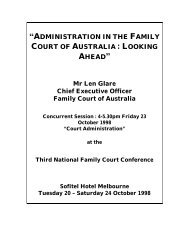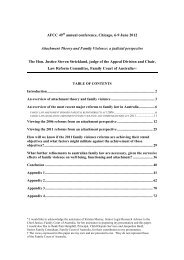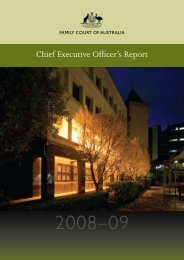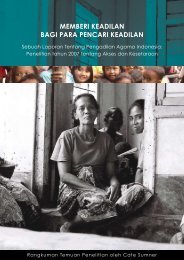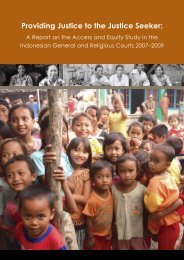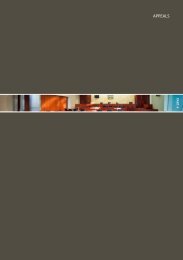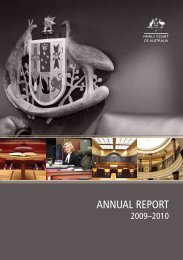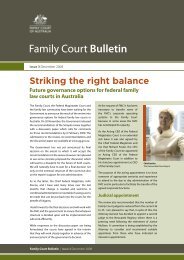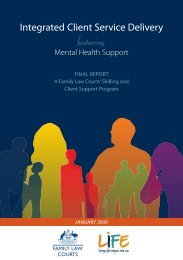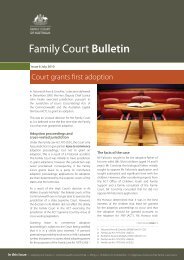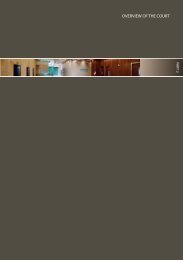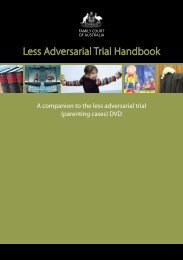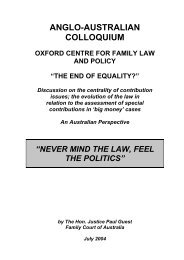Annual report [1997-98] - Family Court of Australia
Annual report [1997-98] - Family Court of Australia
Annual report [1997-98] - Family Court of Australia
You also want an ePaper? Increase the reach of your titles
YUMPU automatically turns print PDFs into web optimized ePapers that Google loves.
The <strong>Family</strong> <strong>Court</strong> <strong>of</strong> <strong>Australia</strong> – annual <strong>report</strong> <strong>1997</strong>-<strong>98</strong><br />
the <strong>Family</strong> Law Reform Act 1996, could not be the subject <strong>of</strong> a contravention application<br />
under s112AD <strong>of</strong> the <strong>Family</strong> Law Act. On appeal, the Full <strong>Court</strong> held that a specific issues<br />
order for joint long-term responsibility is capable <strong>of</strong> being the subject <strong>of</strong> a contravention<br />
application under s112AD <strong>of</strong> the <strong>Family</strong> Law Act. The <strong>Court</strong> also discussed the procedure<br />
to be followed in hearing a s112AD application.<br />
Child support<br />
In Strauss (19<strong>98</strong>) FLC 92-797, the husband had sought a credit for payments made to the<br />
wife and to third parties before any child support liability had been registered. The Full<br />
<strong>Court</strong> upheld the finding by the trial judge that sections 71 and 71A <strong>of</strong> the Child Support<br />
(Registration and Collection) Act 1<strong>98</strong>8apply only to payments made to a payee or to a third<br />
party in respect <strong>of</strong> a maintenance liability which is registered when the payments are made.<br />
In Rocca v Corelli (19<strong>98</strong>) FLC 92-794, an issue arose as to whether a child living in the<br />
household <strong>of</strong> a liable parent was a ‘relevant dependant child’where the liable parent was<br />
not the ‘sole or principal provider <strong>of</strong> ongoing daily care’but shared the care <strong>of</strong> the child<br />
with some other person. The trial judge held that the expression “the sole or principal<br />
provider <strong>of</strong> ongoing daily care” in the definition <strong>of</strong> “relevant dependant child” needs to be<br />
read as applying to “the sole or a principal provider <strong>of</strong> ongoing daily care” so as to give<br />
effect to the intention <strong>of</strong> Parliament, namely, that the exempted income amount <strong>of</strong> a liable<br />
parent be calculated having regard to other commitments that that liable parent has to support<br />
children other than those the subject <strong>of</strong> the application. The trial judge found that to<br />
not make allowance for the support provided by a liable parent to children living in his or<br />
her household where the care <strong>of</strong> the children was shared with some other person would be<br />
manifestly absurd.<br />
In Bertuch v Lynch (19<strong>98</strong>) 92-796, the trial judge discussed in detail the status <strong>of</strong> child support<br />
agreements which have not been accepted under the Child Support (Assessment) Act<br />
1<strong>98</strong>9 and registered under the Child Support (Registration and Collection) Act 1<strong>98</strong>8.<br />
Specific consideration was given by the trial judge to the enforceability and variability <strong>of</strong><br />
an unregistered and unaccepted child support agreement.<br />
Surrogacy<br />
In Re Evelyn (19<strong>98</strong>) FLC 92-807, the trial judge made orders that a child born as a result <strong>of</strong><br />
a surrogacy arrangement reside with the biological mother, her husband and their three children.<br />
The biological mother had been inseminated with sperm from the biological father and<br />
following the birth, the child had resided with the biological father, his wife and their adopted<br />
son for approximately a year. Central to the decision <strong>of</strong> the trial judge were his findings<br />
that the biological mother was better able to deal with the complex problems that would<br />
confront the child, that the biological mother would suffer extreme grief as a result <strong>of</strong> the<br />
loss <strong>of</strong> the child and that there were greater advantages to the child in growing up with her<br />
biological siblings as compared to her adopted brother. An application by the biological<br />
father to admit fresh evidence from an American psychologist who had practised in the area<br />
<strong>of</strong> surrogate parenting for 15 years was refused by the Full <strong>Court</strong>, the <strong>Court</strong> finding that<br />
with due diligence, the evidence would have been available at trial. While indicating that<br />
members <strong>of</strong> the Full <strong>Court</strong> may not have accepted the expert evidence as readily as the trial<br />
46


![Annual report [1997-98] - Family Court of Australia](https://img.yumpu.com/37244799/51/500x640/annual-report-1997-98-family-court-of-australia.jpg)
